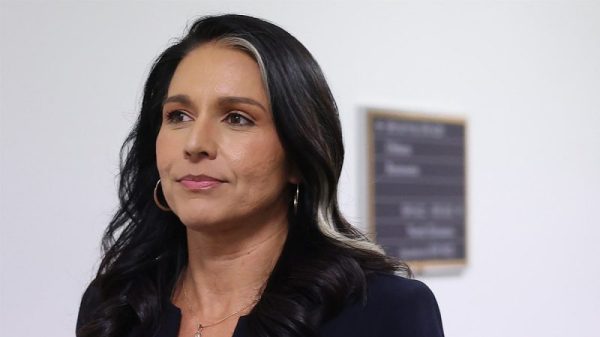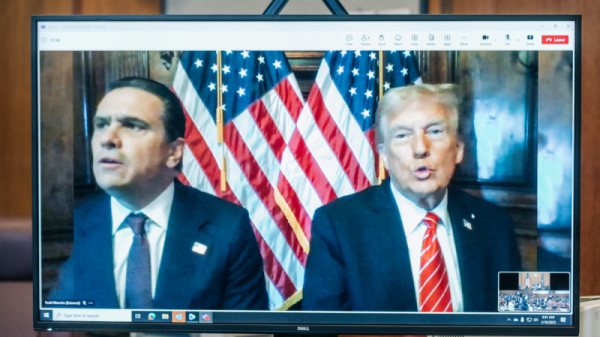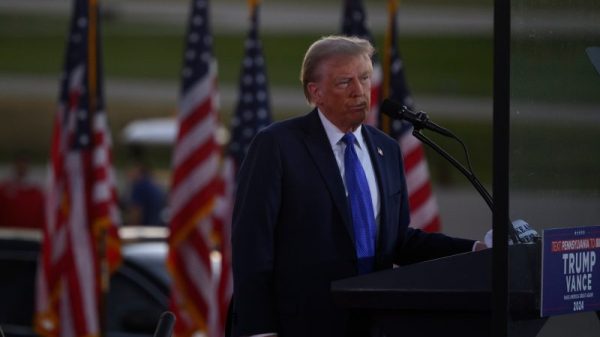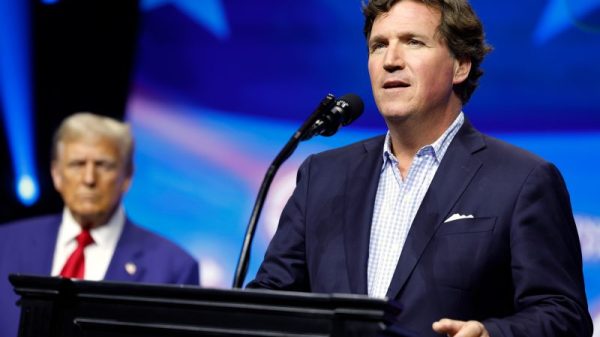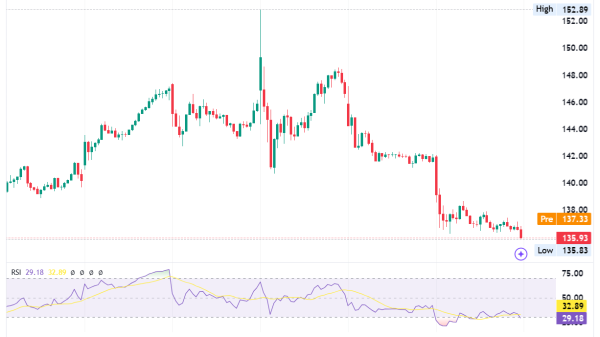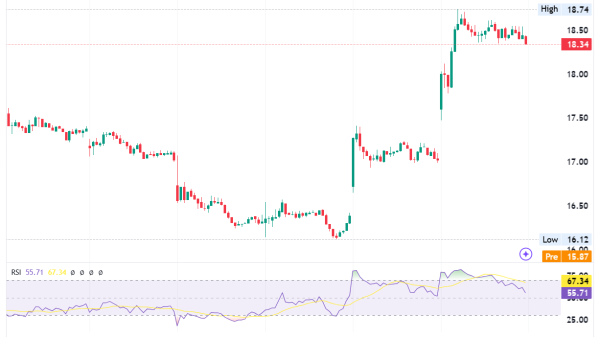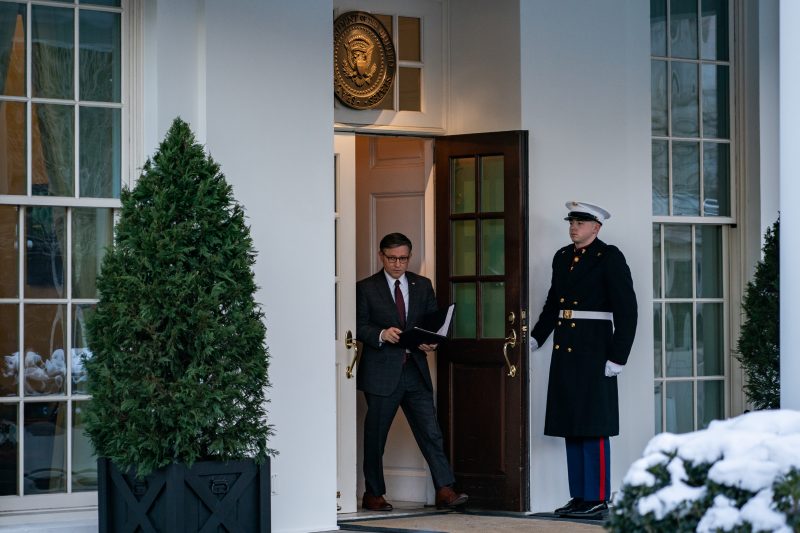President Biden met with congressional leaders Wednesday in an 11th-hour attempt to break a long-running logjam over his funding request for Ukraine, but there was little sign of a breakthrough on Biden’s top foreign policy goal in the hours after the White House meeting.
The bipartisan confab, which aides said was designed to focus specifically on Ukraine, came as the president has struggled to convince congressional leaders of the urgent need to provide additional support for Kyiv’s fight against Russia’s nearly two-year-old invasion, arguing that it is a critical front in the global fight between democracy and autocracy.
As Biden urges lawmakers to back another $60 billion for Ukraine, he faces fresh questions from Republicans over the management of billions of U.S. funds already spent, the contributions of other allies to the effort, and the Ukrainians’ plan for achieving victory after an underwhelming military counteroffensive. Republicans have said for months that Ukraine will not receive additional funds until the crisis at the U.S. southern border is addressed with new limits on migration.
“I told the president what I have been saying for many months, and that is that we must have change at the border — substantive policy change,” House Speaker Mike Johnson (R-La.) told reporters after the meeting.
Biden has said he is prepared to make concessions on border issues, but the negotiations have stretched on for weeks without resolution of key sticking points. While the White House has suggested it is willing to accept some restrictions on the use of asylum, for example, the talks have hit a snag over Republicans’ insistence that Biden accept new limits on his power to allow migrants into the country using an authority known as parole.
Biden sought to make his case directly to the key lawmakers during Wednesday’s meeting, which featured the Democratic and Republican leaders of the House and Senate, as well as the chairs and ranking members of the Appropriations, Armed Services, Foreign Relations and Intelligence committees. It gave Biden an opportunity to underline his message amid a feeling on both sides that, with the election approaching and Ukraine running out of funds, time for a deal was growing short.
Even before the meeting, Johnson was critical of negotiations in the Senate over a border deal, suggesting that the Republican-led House would insist on even tougher immigration changes. “Before we even talk about Ukraine, I am going to tell the president what I’m telling all of you and we’ve told the American people: border, border, border,” Johnson told reporters.
The negotiations carry high stakes on several fronts. Aid to Ukraine, one of Biden’s top foreign policy priorities, is in danger of lapsing for the first time since Russia’s invasion. Border security is a volatile issue whose lack of a resolution could damage Biden politically. And the talks accompany wrangling over a long-term spending bill, whose outcome will determine whether the government shuts down within weeks.
Democrats afterward portrayed the meeting in a relatively positive light, with House Minority Leader Hakeem Jeffries (D-N.Y.) calling it a “very positive, forward-looking, candid discussion.”
Senate Majority Leader Charles E. Schumer (D-N.Y.) told reporters he was optimistic that the two sides would ultimately avert a government shutdown and pass a major package with funding for Ukraine, Israel, the Indo-Pacific and the border.
“I am more optimistic than ever before that we can come to an agreement,” he said. “I put the chances at a little bit greater than half now. And that’s the first time I can say that.”
Leaders of the two parties agreed that both Ukraine and the border must be addressed, Schumer said.
“Just about every person in that room — Democrat, Republican, House, Senate — talked about the importance of aiding Ukraine. And everyone in the room also talked about that we had to do something about the border,” Schumer told reporters after returning to the Capitol. “It’s broken. President Biden said he knows that and wants to really make significant change on the border.”
Rep. Michael McCaul (R-Tex.), who attended the meeting as chairman of the House Foreign Relations Committee, noted that Biden said he is ready to change border policy and that leaders of both parties voiced support for Ukraine. “There was a consensus on the fact that we can’t abandon our allies,” he said, because if Russia takes over Ukraine it would likely attack NATO countries and require a much larger U.S. response.
But a significant faction of conservative House Republicans has expressed doubt about the need to continue spending money on a war that is so distant from American shores. And border security has proven a powerful issue for the GOP, leaving it unclear whether party leaders will ultimately see an advantage in reaching an agreement with Biden on the issue.
The White House tried to use Wednesday’s meeting to both invoke the seriousness of Ukraine’s predicament and address Republican concerns that funding for Kyiv has been accompanied by too little accountability.
“This whole idea of a blank check … is not true,” National Security Council spokesman John Kirby told reporters ahead of the meeting. “Every single aid package that we provided Ukraine, we have done consultations with Congress.” He added that Ukraine’s troops are running low on several critical munitions.
In late December, the Biden administration announced a new $250 million weapons package for Ukraine, marking what officials said could be a final consignment from U.S. stockpiles unless Congress acts. Biden’s current request would give the administration an additional $7 billion in authority to make arms donations to the beleaguered country.
It would also provide $18 billion for replenishing U.S. weapons stockpiles; $12 billion for longer-term arms contracts for Ukraine; funding for U.S. military operations in Europe; and investments in manufacturing missiles.
Also hanging in the balance is a potential shutdown of major parts of the U.S. government, which some GOP lawmakers see as another form of leverage for negotiating tough border restrictions. On Tuesday, Congress took an initial step toward avoiding a government shutdown that would otherwise start at the end of the week, extending the deadline to early March.
Rep. Dan Bishop (R-N.C.), a member of the House Freedom Caucus, suggested that Johnson and other Republicans should not be afraid of a government shutdown if it means getting a win on the border, although that opinion is not widely shared among House Republicans.
“I’m not in favor of willy-nilly or just on a whim shutting down government,” Bishop said. “But the American people — I’ve seen a tremendous upswell of expression of support for the idea that we’ll deal with this in a way, and that may involve a shutdown. I wouldn’t be reticent about that to make them solve this problem.”
Schumer took issue with GOP demands that a border deal must precede any talk of more aid for Ukraine. “Anyone who says we have to do one first before we do the other means we won’t get any of it done,” he said.
As Russian President Vladimir Putin insists publicly that he is not prepared to back down in the ongoing war, European nations are also experiencing divisions over funding for Ukraine. The leaders of Hungary and Slovakia have voiced doubts over a European Union plan to finance an aid package for Ukraine worth more than $50 billion. Some European officials, including Hungarian President Viktor Orban, have suggested they are skeptical of Ukraine’s ability to prevail militarily against Russia, calling for the two sides to negotiate.
The domestic politics of the U.S. southern border have also been heating up, as Biden ramps up his reelection campaign against the backdrop of record surges in illegal migration. In several recent polls, Biden’s handling of immigration and border issues have received low marks from voters.
Biden’s leading Republican rival, former president Donald Trump, won a landslide victory in the Iowa caucuses on Monday, building momentum for a campaign that has made immigration a central attack point against the president.
Marianna Sotomayor, Missy Ryan and Leigh Ann Caldwell contributed to this report.


